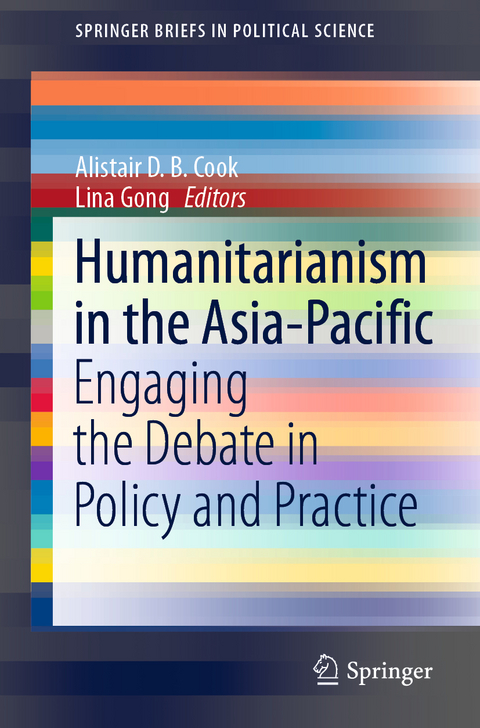
Humanitarianism in the Asia-Pacific
Springer Verlag, Singapore
978-981-334-873-8 (ISBN)
Dr Alistair D. B. Cook is Coordinator of the Humanitarian Assistance and Disaster Relief Programme and Senior Fellow at the Centre for Non-Traditional Security Studies (NTS Centre), S. Rajaratnam School of International Studies (RSIS), Nanyang Technological University (NTU) in Singapore. His research interests focus on the Asia-Pacific, in particular Myanmar, humanitarian affairs, foreign policy and regional cooperation. He has taught undergraduate, graduate and professional development courses at Purdue University, University of Melbourne, Deakin University, Nanyang Technological University, Australian National University, Singapore Civil Defence Academy and SAFTI. Dr Lina Gong is a Research Fellow in the HADR Programme, at the Centre for Non-Traditional Security Studies (NTS Centre), S. Rajaratnam School of International Studies (RSIS), Nanyang Technological University (NTU). Lina holds a B.A. in English Language and Literature and an M.A. in Interpreting and Translation from Sichuan University, China. She received her Ph.D. from RSIS, NTU, with a thesis is on China’s engagement with UN peacekeeping. Her research interests include non-traditional security studies in East Asia, China and global governance, peace and conflict, and the marine environment. She has published several journal articles and book chapters on non-traditional security issues in Asia as well as China’s engagement with UN peace efforts.
Chapter 1: The Evolving Humanitarian Landscape: Rise of the Asia-Pacific Region.- Chapter 2: China and Humanitarian Affairs: Thinking, Policy and Prospects.- Chapter 3: The PLA’s HADR Operations at Home and Abroad: Embedding War Preparation in Humanitarian Endeavors.- Chapter 4: Sino-Nepal Cooperation in Disasters: Dynamics and Challenges.- Chapter 5: Chinese Humanitarian Leadership in the UN and Multilateral System.- Chapter 6: India’s Response to Humanitarianism: A Synopsis.- Chapter 7: Japan’s New Security Perspective on Humanitarian Assistance.- Chapter 8: Australia and the South Pacific Islands in Humanitarian Assistance and Disaster Relief.- Chapter 9: Active Regional Humanitarian Platforms – The case of ASEAN.- Chapter 10: Reinforcing Universal Values for Humanitarian Cooperative Arrangements in Asia.- Chapter 11: Military Humanitarianism in the Asia-Pacific.- Chapter 12: Indonesia’s Humanitarian Engagements: Perspectives, Limitations and Prospects.- Chapter 13: The HumanitarianFace of US-Philippines Security Alliance: Humanitarian partners, friends and allies.- Chapter 14: The Role of Civil Society in Disaster Response – the Philippine Experience.- Chapter 15: Private Sector: Under-appreciated actors in disaster response and recovery.- Chapter 16: Future Research Directions for Humanitarian Affairs in the Asia-Pacific.
| Erscheinungsdatum | 19.03.2021 |
|---|---|
| Reihe/Serie | SpringerBriefs in Political Science |
| Zusatzinfo | 1 Illustrations, black and white; VI, 95 p. 1 illus. |
| Verlagsort | Singapore |
| Sprache | englisch |
| Maße | 155 x 235 mm |
| Themenwelt | Recht / Steuern ► EU / Internationales Recht |
| Recht / Steuern ► Öffentliches Recht ► Völkerrecht | |
| Sozialwissenschaften ► Politik / Verwaltung ► Europäische / Internationale Politik | |
| Sozialwissenschaften ► Politik / Verwaltung ► Vergleichende Politikwissenschaften | |
| Sozialwissenschaften ► Soziologie ► Spezielle Soziologien | |
| Schlagworte | Civil-Military Relations in Asia-Pacific • disaster management • Disaster Preparedness • Disaster Response • Disasters and Conflict • Emergency preparedness • emergency response • Humanitarian Affairs in Asia-Pacific • Humanitarian Assistance and Disaster Relief • Regional Humanitarianism |
| ISBN-10 | 981-334-873-9 / 9813348739 |
| ISBN-13 | 978-981-334-873-8 / 9789813348738 |
| Zustand | Neuware |
| Haben Sie eine Frage zum Produkt? |
aus dem Bereich


